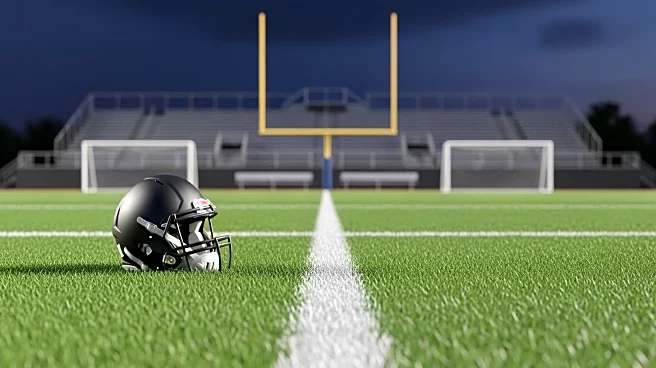What's Happening?
Arch Manning, the quarterback for the Texas Longhorns, sustained a concussion during the team's overtime victory against Mississippi State. The incident occurred during Texas' first possession in overtime when
Manning was tackled, causing his head to hit the turf. Following the injury, Manning was taken to the medical tent and did not return to the game. Backup quarterback Matthew Caldwell stepped in and led the team to a 45-38 win with a decisive touchdown pass. Manning's status for the upcoming game against Vanderbilt remains uncertain, pending further evaluations.
Why It's Important?
Manning's injury is significant as he is a key player for the Texas Longhorns, contributing to their recent successes. His absence could impact the team's performance in upcoming games, particularly against Vanderbilt. The concussion also highlights the ongoing concerns about player safety in college football, emphasizing the importance of concussion protocols. The Longhorns may need to rely on backup quarterback Matthew Caldwell, who demonstrated his capability by securing the win against Mississippi State. This situation could affect Texas' standings and strategy in the college football season.
What's Next?
Texas will need to assess Manning's condition and determine his availability for future games. The team will follow the college football concussion protocol, which involves a multi-step process to ensure player safety before returning to play. Coach Steve Sarkisian has indicated that more information will be available once the team returns to Austin. Meanwhile, Matthew Caldwell may continue to play a crucial role as the starting quarterback if Manning is unable to participate. The team's strategy and preparation for the game against Vanderbilt will likely be adjusted based on Manning's recovery progress.
Beyond the Headlines
The incident underscores the importance of concussion awareness and management in sports, particularly in contact sports like football. It raises questions about the adequacy of current safety measures and the long-term health implications for athletes. The situation may prompt discussions on improving protective gear and revising protocols to better safeguard players. Additionally, Manning's injury could influence recruitment and training practices, as teams seek to minimize risks and ensure the well-being of their athletes.










